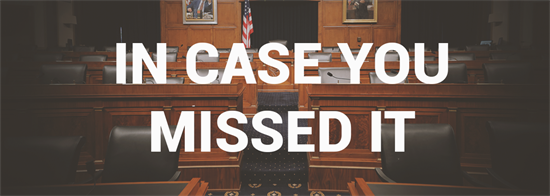Washington Examiner: Big banks love Democrats' big government
Washington,
May 23, 2017
5/22/2017 House Democrats had gathered inside the Financial Services Committee for a special minority hearing to discuss the dangers of rolling back the Dodd-Frank Act's sweeping regulations. Instead of bankers or traders or regulators, Democrats called none other than Sen. Elizabeth Warren to testify. Warren loves to talk tough as though she is the crusading scourge of Wall Street. But is that really so? There was a tension over what to do with Dodd-Frank. Goldman Sachs CEO Lloyd Blankfein said just after the 2016 election, "I wouldn't want regulation to be repealed in total." In a 2013 interview, JPMorgan Chase CEO Jamie Dimon bragged that Dodd-Frank helped his bottom line by building a "bigger moat" making it harder for competitors to get into the citadel of riches. As Congress considered the bill in 2010, Blankfein admitted that his bank would be "among the biggest beneficiaries" of Dodd-Frank. So Financial Services Committee Chairman Jeb Hensarling hit the bullseye when he called the faux hearing "awkward for the Democrats." "Barack Obama is pocketing $400,000 for a Wall Street speech and Prof. Warren is joining Wall Street CEOs in defending Dodd-Frank. How awkward for the Democrats," Hensarling said. "Community banks and credit unions are supporting the Financial CHOICE Act," Hensarling's bill to replace Dodd-Frank. "Wall Street CEOs and Democrats are the ones saying, ‘Don't repeal Dodd-Frank.' " The Congressional Budget Office on Thursday added heft to Hensarling's argument. It scored the CHOICE Act as saving taxpayers more than $24 billion, in a very special and telling way. The CBO reports that the bill "would repeal the FDIC's authority to use the [Orderly Liquidation Fund] to resolve large, systemically important financial firms (including banks and nonbank firms) that become or are in danger of becoming insolvent, subject to certain conditions." The translation of this legalese is that Dodd-Frank's process for liquidating big banks risks taxpayer money. By removing that risk, the CHOICE bill would reduce the deficit. The odds of a bailout through the OLF is small, the CBO said, but it's still a risk. "Although the probability that the FDIC would have to liquidate a systemically important firm in any year is small, the potential associated cash flows would probably be large." By CBO's accounting, removing this risk counts as a $15.5 billion in savings over a decade. Here's the other telling part of the CBO report. It says the biggest banks don't want to be freed from Dodd-Frank's regulations. Let's just say that again: big banks don't want to be freed from Dodd-Frank regulations. And we're supposed to believe the Democrats are crusaders against big banks? Seriously? Dodd-Frank imposed regulations on banks with the aim of preserving safety and soundness. They were complicated, complex, and costly. The CHOICE Act's name derives in part from the choice it offers banks, the option to get out from the under these rules and all dealings with regulators and reporting requirements by setting aside more reserves as a bigger cushion. In other words, if a bank takes the traditional approach to safety and soundness, which is to set aside sufficient reserves, it doesn't have to live by some of Dodd-Frank's other rules. But the big guys won't take this offer. "CBO anticipates that, for example, the eight large banks headquartered in the United States that are characterized as globally systemic important banks (G-SIBs) would not make the election because they would have to raise much more capital," the CBO concludes. The clear implication is that the behemoths, including Citigroup, JPMorgan Chase, Bank of America, Goldman Sachs, Wells Fargo, and Morgan Stanley, are content with Dodd-Frank's regulations. They can afford the lawyers, lobbyists, and financial gymnastics to fit their risk-taking into whatever rules the regulators (many of whom will someday work for the banks they are regulating) throw at them. Regulation of any industry adds to costs, which big business is most able to absorb. The more government gets involved, the bigger the advantage for banks who have the best team of lawyers and lobbyists. And that's never Mom n' Pop — of community banks. The CHOICE Act would take some deregulatory steps that please the big banks, including repealing some Dodd-Frank rules for all banks and taming the Consumer Financial Protection Bureau. Nonetheless, the CBO report helps rebut a standard Democratic myth, that their big-government policies stick it to the big guys while the GOP's opposition sticks it to the little guys. The truth, which the big bankers admit, is that regulation and bailouts, that is, big government, is their preferred environment. When it comes to banking, as when it comes to so many other things such as job creation, the Democratic Party is the party of the 'haves' and the GOP is the party of the 'have-nots.' That's doesn't fit with popular political myth, but it's the truth. It's a pity the Republicans are so bad at conveying this message, but that's another story. |


